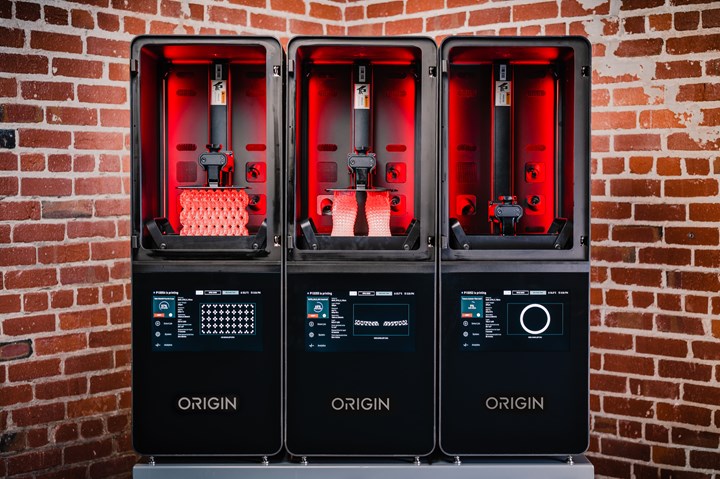Stratasys to Acquire 3D Printing Startup Origin
The acquisition is expected to close in January 2021.

Origin's 3D printers are well-suited to mass production of end-use parts, which is the fastest growing segment of the 3D printing industry and a strategic priority for Stratasys.
Stratasys Ltd. will acquire 3D printing startup Origin Inc. The Origin team will join Stratasys and lead the development of its technology and product platform, with a full global launch via the Stratasys go-to-market organization towards mid-2021.
Stratasys expects Origin’s proprietary Programmable PhotoPolymerization (P3) technology to be an important growth engine for the company, adding up to $200 million incremental annual revenue within five years. The acquisition will help expand Stratasys’ position in polymers and production applications of 3D printing in industries such as dental, medical, tooling, and select industrial, defense, and consumer goods segments.
Origin’s P3 technology, an advancement on Digital Light Processing (DLP) principles, cures liquid photopolymer resin with light. The company’s first manufacturing-grade 3D printer, Origin One, controls light, heat, and force, among other parameters, via Origin's closed-loop feedback software. This new technology reportedly enables customers to build parts with accuracy, consistency, size and detail, while using a wide range of commercial-grade, durable resins.
Origin works with a network of material partners such as Henkel, BASF and DSM to develop resins for its system. “We partnered and developed materials with Origin before Origin One was launched because we believed in their technology and vision for the future of photopolymers in additive manufacturing,” said François Minec, managing director at BASF 3D Printing Solutions GmbH. “Now, as part of Stratasys, we’re confident that together we can take on the broader manufacturing ecosystem.”
Origin One systems have been successfully deployed across a variety of industries, including shoe manufacturer ECCO.
The COVID-19 pandemic further illustrated Origin’s technology fit for production applications, including hundreds of thousands of clinically validated nasopharyngeal swabs, thousands of PPE face shields, and ventilator splitters for hospitals.
According to an internal Stratasys market analysis, manufacturing applications show the most potential for significant growth in the 3D printing industry, reaching approximately $25 billion by 2025. Stratasys anticipates that production-oriented resin-based solutions can address a significant part of the total market for polymer additive manufacturing. It is estimated that resin polymer-based additive systems will grow at a 20% annual rate from 2020 to 2025.
“Our customers are looking for additive manufacturing solutions that enable use of industrial-grade resins for mass production parts with process and quality control,” said Stratasys CEO Yoav Zeif. “We believe Origin’s software-driven Origin One system is the best in the industry by combining high throughput with incredible accuracy. When combined with Origin’s extensive materials ecosystem and our industry-leading go-to-market capabilities, we believe we will be able to capture a wide range of in-demand production applications on a global scale.”
Related Content
-
NPE 2024: Additive Manufacturing Assisting, Advancing Plastics Processing
Exhibitors and presenters at the plastics show emphasized 3D printing as a complement and aid to more traditional production processes.
-
Make Every Shot Count: Mold Simulation Maximizes Functional Parts From Printed Tooling
If a printed tool only has a finite number of shots in it, why waste any of them on process development?
-
Business Slowing? There's Still Plenty of Stuff to Do
There are things you may have put off when you were occupied with shipping parts to customers. Maybe it’s time to put some of them on the front burner.
















